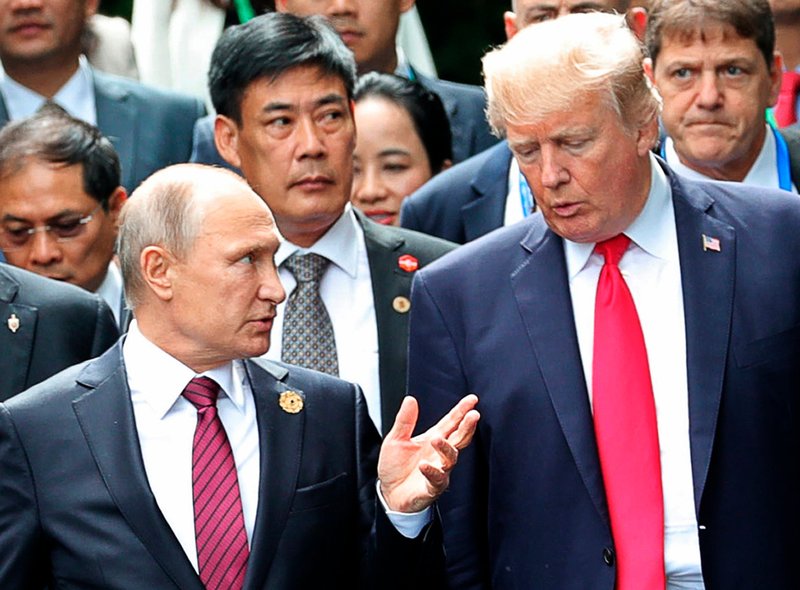It all started with a phone call.

After U.S. President Donald Trump and Russian President Vladimir Putin spoke on the phone on March 20, Trump said he hoped to meet with the recently re-elected leader “in the not too distant future.”
WATCH: Russia retaliates, expels diplomats from 19 countries

Since then, two dozen countries — including the U.S., many European Union nations, and NATO — expelled more than 150 Russian diplomats in solidarity with Britain over the poisoning of former spy Sergei Skripal, and his daughter, Yulia. Moscow has denied any involvement in the nerve attack and retaliated by expelling the same number of diplomats from each nation.
According to the White House, however, the Trump administration is still amenable to a meeting between U.S. President Donald Trump and Putin at the Pennsylvania Avenue estate, with the Kremlin commenting earlier on Monday that it was Trump himself who invited Putin during their call.
WATCH: Russia expels scores of Western diplomats, including Canada, in retaliation for expulsion of its own

Putin visiting the White House would mark the leader’s first trip to Washington in over a decade, a possibility that’s brought on a flurry of international and domestic backlash.
Why this is unusual — especially right now
Putin hasn’t been invited to visit the White House in over 10 years, since he met President George W. Bush in 2005, due to deteriorating relations between the United States and Russia.
Experts fear that going forward with such a meeting without directly addressing Russia’s interference in the 2016 U.S. presidential election, or allegations that Russia masterminded the nerve agent attack on Skripal, would discount the seriousness of the foreign policy issues currently standing between the two nations.
“This invitation undermines the new sanctions that were just put in place,” explained Matthew Schmidt, an associate professor of national security at the University of New Haven. “And, not bringing up Skripal undermines the protection of international diplomatic norms.”
In addition, Schmidt points to Russia’s role in the Syrian conflict and the annexation of Crimea from Ukraine in 2014 as other pressing issues that have yet to be completely resolved.
Trump has already been criticized by Republican lawmakers for congratulating Putin on his re-election during their phone call while failing to raise Skripal’s poisoning.
The fact that Trump also extended a White House invitation during that call was likely to increase concerns that Trump, when in direct contact with Putin, is inclined to offer olive branches and is reluctant to raise difficult issues.
WATCH: NATO sends ‘clear message’ to Russia that behaviour won’t be tolerated

“Nothing about this is normal,” warns Alina Polyakova, a foreign policy fellow at the Brookings Institution. ““It would confer a certain normalization of relations and we’re certainly not in a normal space,” she told the Associated Press.
A boon for Putin
According to experts, being welcomed into the East Room would be a significant achievement for the Russian leader and a major boost to his image.
“I worry that Trump wittingly or unwittingly may be sending a more positive signal to Putin than he deserves,” said Nicholas Burns, a top state department official during the Bush administration who also served as U.S. ambassador to NATO.
In addition, experts went on to denounce the meeting as one that shouldn’t take place without an underlying national security goal for the United States.
WATCH: U.S., other European states expel Russian diplomats in response to U.K. spy attack

Michael McFaul, who served as the U.S. ambassador to Russia under former president Barack Obama, said “the only reason you should do it is if you’re going to obtain a concrete objective that serves America’s national security interest before the meeting,” he said.
Furthermore, Schmidt suggests that issuing an invitation to Putin does just the opposite by isolating Trump from international allies and American citizens.
“This has created a rift in the U.S.-British alliance because Great Britain is feeling very under attack by Russia right now,” he said. “Furthermore, the message this sends to the rest of the country is that he’s not protecting American interests.”
No date has been set for a prospective meeting between Putin and Trump, and reports indicate that neither party has begun preparations.
— With files from the Associated Press.




Comments